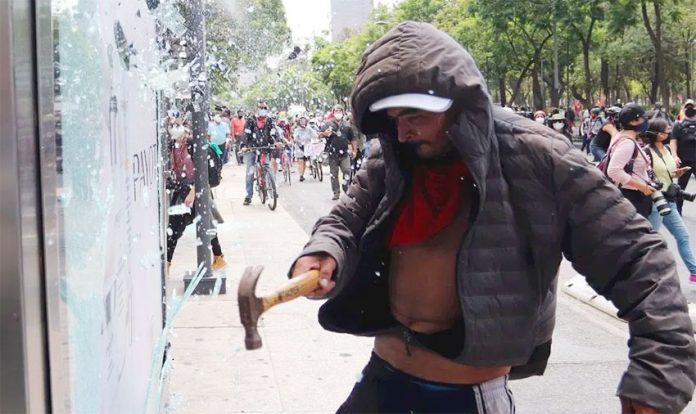The first time I had to go to the United States Embassy in Mexico City was in 2012. My passport had expired and my name needed fixing anyway. As anyone who’s ever had to get any kind of documents here can tell you, an extra space can basically make you, well, not you in the eyes of the state.
It was a relatively straightforward, if not long process, and I eventually completed the strange experience of getting paperwork done in Mexico (in English!) with other estadounidenses.
I was excited that day, too, to meet a new friend at the nearby Starbucks, a place where I felt both self-consciously and fraudulently bourgeoise. I’d grown up in a pacifist, activist family, after all, and I couldn’t shake the feeling that I was on the wrong side of the glass.
The backdrop to that day was a protest in front of the embassy. I’m not sure what was going on, but there were police in riot gear, and I was nervous. I mean if I were looking to upset the status quo, a Starbucks seemed like a fair and vulnerable place to start some rabble-rousing.
In the end nothing too dramatic happened that day, at least that I could tell. I went back home with my new passport and a new best friend.
I’ve been thinking about that day frequently ever since I read about the rioting last Thursday in Mexico City following a peaceful vigil the day before in solidarity with the Black Lives Matter movement that began in the U.S. and whose demonstrations have now spread to nearly all of the world’s major cities.
In an eerie reflection of brutality north of the border, police have not been doing a fantastic job at garnering sympathy among the public in Mexico. The famous case of the arrest and subsequent death by beating of Giovanni López for not wearing a face mask sparked protests in Guadalajara, which in turn have led to even more police brutality (see here, here, and here. Oof.)
Xalapa, Veracruz, has its own version of this from a month ago, a man named Carlos Andrés Navarro Landa who died in police custody after a violent arrest.
Though we don’t know exactly how, social movements under the right circumstances tend to spread, as real as any viral contagion or forest fire. Yesterday in Xalapa we saw something similar: in the name of protesting “police repression” — which is, clearly, a serious problem — vandals swept the downtown area, breaking glass and spray-painting walls.
The main victims don’t seem to have been primarily small independent business, though they were certainly affected. Many bank windows and ATMs were destroyed. On the main Bancomer in the central plaza, “You owe your life to the bank” was spray-painted on the outside wall. Government buildings were also a target.
As many pointed out afterwards, there’s nothing small, struggling businesses already gasping for breath amidst the Covid-induced economic crisis have to do with police repression. My skepticism rises slightly when it comes to international banks and large, extremely profitable chains, but chaos is chaos, and it instills in me a kind of primal fear that I work hard to avoid.
So what’s going on here?
It is my sincere belief that all violence is ultimately an expression of pain. Sometimes it’s the real pain of individual and societal oppression. Often it’s the pain of frustration of not being listened to or taken into account when you have real, unacceptable problems that no one in power will take seriously.
So how do you get people to take you seriously when you’re more angry than you’ve ever been? “Have patience, we’ll get to it, be good?” But no one is “getting to it.” If the state were a boyfriend, we’d have broken up with him long ago. I mean, that’s clearly an abusive relationship.
As well, you have a lot of people with a lot of free time on their hands because of the quarantine, very little money, and very much stress. No economic recovery has been forthcoming, nor any meaningful help for average workers who are still expected to pay for all of their needs: food, shelter, tuition for schools that are closed, the water bill, the electricity bill, gas.
I think the root message is this: until these problems are fixed, no one gets to live in peace. “Por las buenas” has been tried, and nothing has changed. So what comes next?
So do I approve of violent protest? Well, no, of course not. It’s scary. I fear for my safety. More than anything, I fear for my child’s safety. Nothing is more terrifying than imagining her getting caught in the crossfire of others’ rage.
But people, we’ve got to fix these things. And the way to fix them isn’t simply to throw everyone that participated in jail. Fine, prosecute. But let’s please address the root problems that got us to this point in the first place. People don’t just start destroying their own environment because it’s fun and they’re bored and it’s something to do.
It’s a cry of desperation: “Just listen to us! Just fix this unbearable thing!”
•
I’ve been thinking about that famous Langston Hughes poem for a couple of days now. It’s called Harlem, though most people (including me) remember it as A Dream Deferred. Observing the pain and raw emotion coming out in protests all over the world, that last line is playing on repeat in my head: “Or does it explode?”
To end today’s column, a pertinent poem for your reflection:
Harlem
What happens to a dream deferred?
Does it dry up
like a raisin in the sun?
Or fester like a sore—
And then run?
Does it stink like rotten meat?
Or crust and sugar over—
like a syrupy sweet?
Maybe it just sags
like a heavy load.
Or does it explode?
Sarah DeVries writes from her home in Xalapa, Veracruz.
